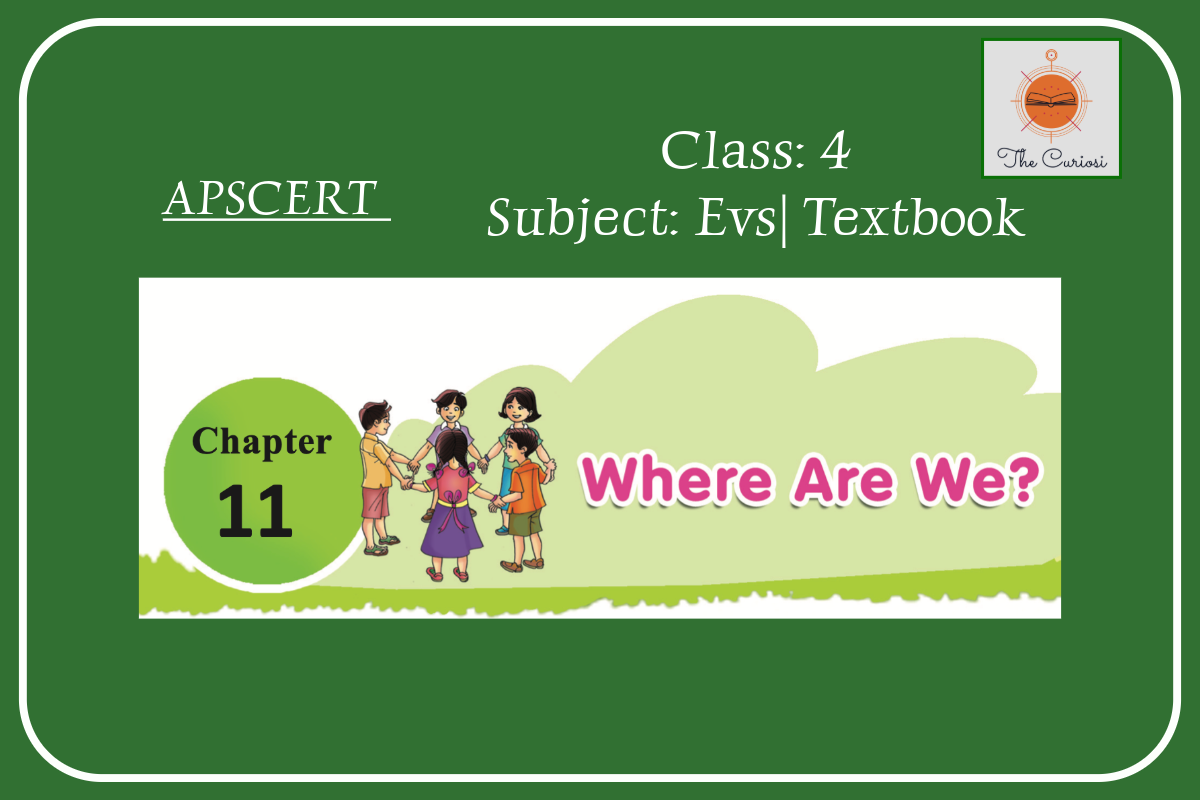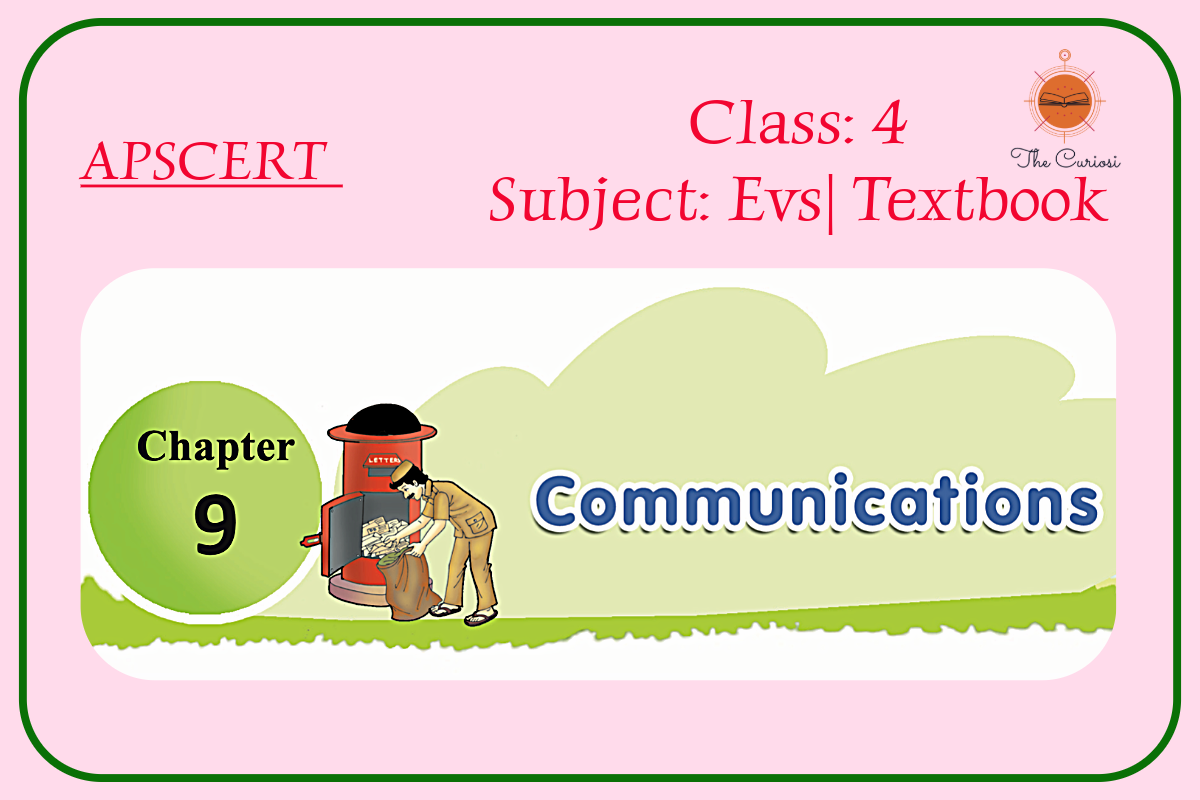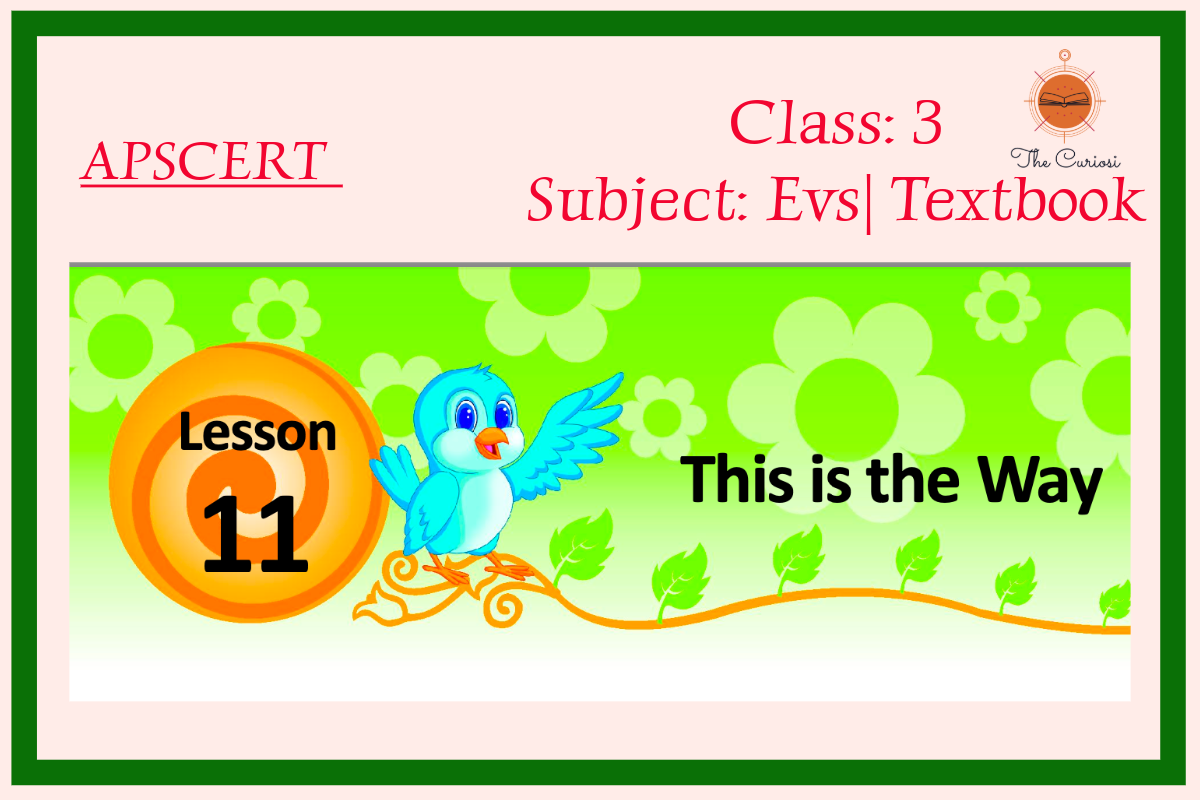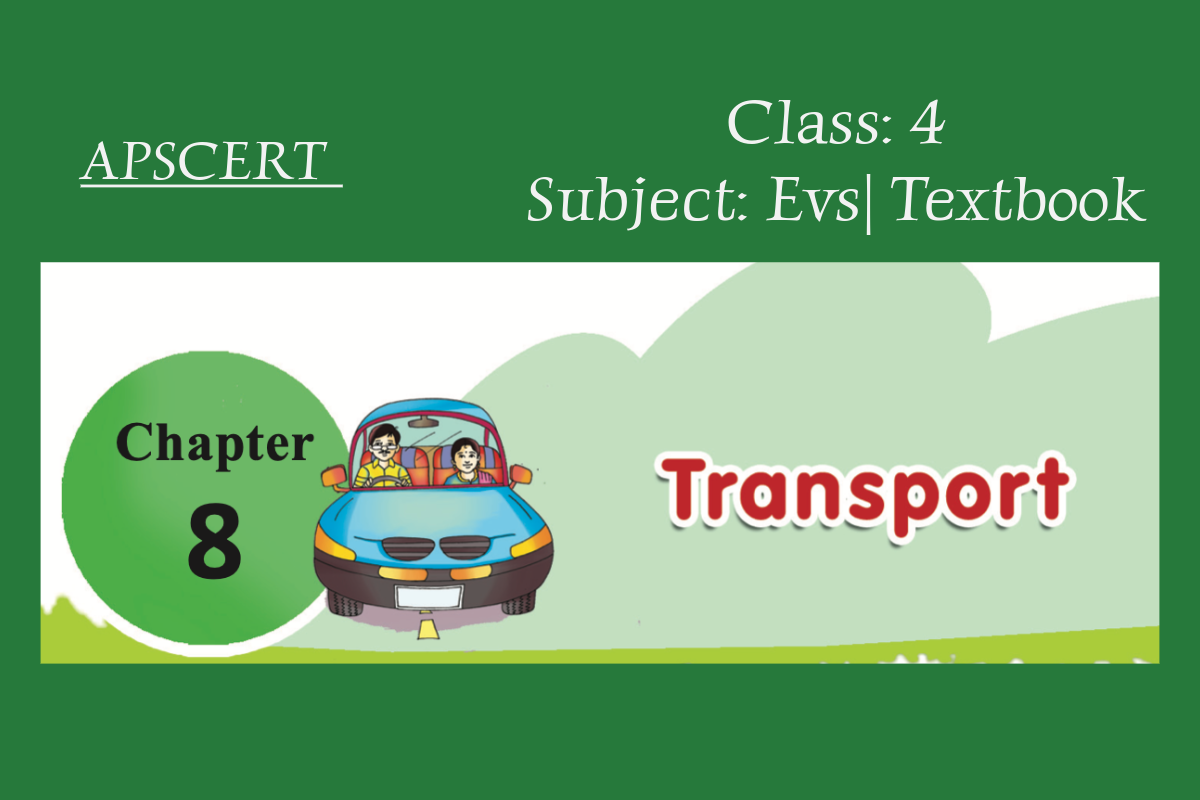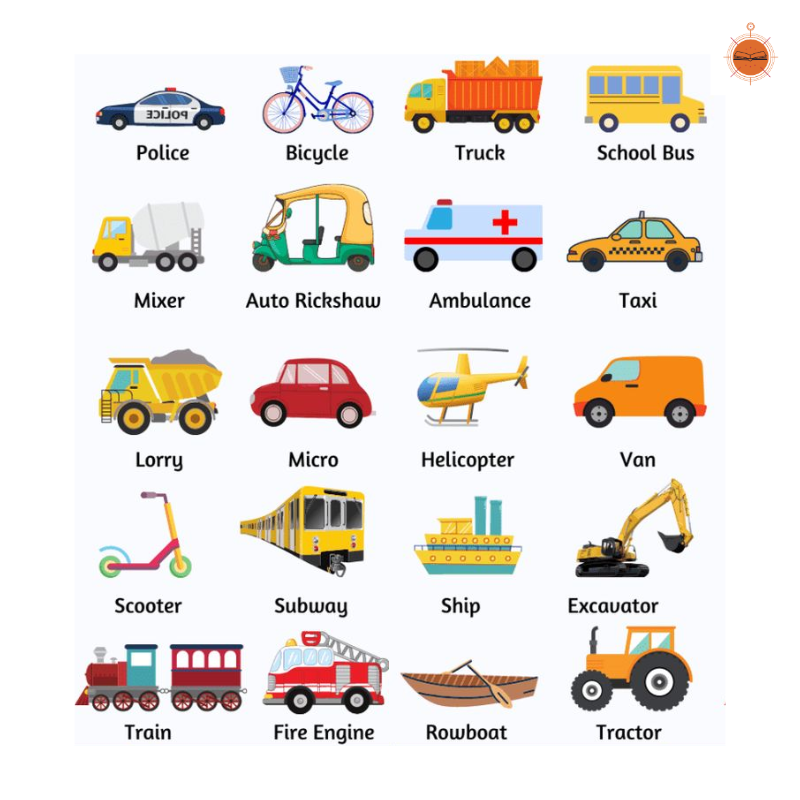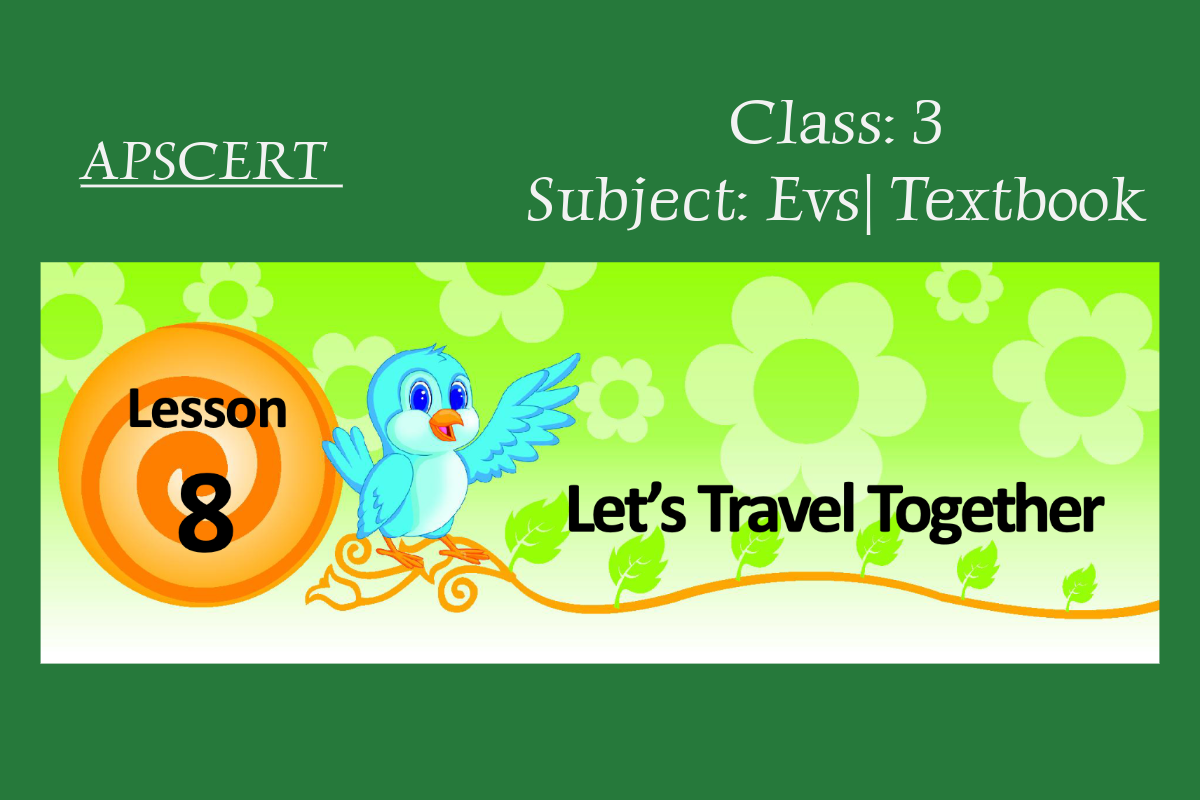Your cart is currently empty!
Tag: Improve your learning

Where Are We
Class 4 | EVS | Textboook | Chapter 11 | Solutions | Improve Your Learning
Andhra Pradesh | APSCERT
Here are the answers to the “Improve Your Learning” section from the lesson “Where Are We” for Class 4 EVS:
I. Conceptual Understanding
1. How many continents are there on the Earth? What are they?
• There are seven continents on the Earth:
1. Asia
2. Africa
3. North America
4. South America
5. Antarctica
6. Europe
7. Australia
2. Name the oceans on the Earth.
• There are five oceans on the Earth:
1. Pacific Ocean (largest and deepest)
2. Atlantic Ocean
3. Indian Ocean
4. Arctic Ocean
5. Antarctic (Southern) Ocean
3. What is rotation? What is revolution?
Rotation vs. Revolution
Rotation:
• Definition: Rotation is the spinning of the Earth on its own axis.
• Effect: It causes day and night.
• Time Taken: The Earth completes one full rotation in 24 hours (1 day).
• Example: When the Earth rotates, the side facing the Sun experiences day, while the opposite side has night.
Revolution:
• Definition: Revolution is the movement of the Earth around the Sun in an elliptical orbit.
• Effect: It causes seasons (summer, winter, spring, autumn).
• Time Taken: The Earth completes one full revolution in 365¼ days (1 year).
• Example: Different parts of the Earth receive varying amounts of sunlight throughout the year, leading to seasonal changes.
Key Differences Between Rotation and Revolution:
Feature Rotation Revolution What it does Earth spins on its axis Earth moves around the Sun Causes Day and night Seasons Time Taken 24 hours (1 day) 365¼ days (1 year) Axis or Orbit? Spins around its axis Moves in an elliptical orbit around the Sun II. Questioning and Hypothesis
4. Aruna wants to visit Vijay’s home. What questions should she ask to reach his home?
• What is your house number and street name?
• Which village or city do you live in?
• What is the landmark near your house?
• What is your pincode?
• What are the directions from the nearest bus stop or railway station?
III. Experiments and Field Observations
5. Visit your village gram panchayat office and observe its functions. Write a brief note.
(Students should visit and observe, but here’s a sample response:)
• The gram panchayat office helps in the development of the village.
• It maintains records of people, issues certificates, and conducts meetings.
• The panchayat ensures cleanliness, water supply, and road maintenance.
• It also solves local disputes and implements government schemes.
IV. Information Skills and Projects
6. Draw a map from your home to the school.
(Students should create their own map showing roads, landmarks, and important places on the way.)
V. Drawing and Model Making
7. Draw the oceans and continents on a chart and color them.
(Students should draw and use brown for continents and blue for oceans.)
VI. Appreciation
8. Write two slogans to save the Earth.
1. “Save Earth, Save Future!”
2. “Protect Nature, Protect Life!”

Chapter 9: Communications | Class 4 | Evs Textbook | Solutions
APSCERT | ANDHRA PRADESH
Here are the answers to the “Improve Your Learning” section from the lesson Communication (Class 4 EVS):
I. Conceptual Understanding
1. What is the means of communication? How many types of communication are there?
• Communication is the process of sharing ideas, thoughts, and feelings with others.
• There are two types of communication:
1. One-to-One Communication – Communication between individuals (e.g., letters, phone calls).
2. Mass Communication – Communication to a large audience (e.g., newspapers, television, radio).
2. Mention the ways for speedy communication.
• Mobile phones
• E-mails
• SMS (Short Message Service)
• Social media (WhatsApp, Facebook, etc.)
• Television and radio broadcasts
3. What are the precautions you should take in the use of mass media?
• Avoid excessive screen time to protect eyesight.
• Be careful while sharing personal information online.
• Avoid listening to loud music with earphones for long periods.
• Verify news before believing or sharing it.
• Do not spend too much time on social media, as it can affect studies.
II. Questioning and Hypothesis
4. What questions would you ask the postmaster about the postal services?
• What are the different types of letters and parcels sent through the post office?
• How is a letter sorted and delivered to different locations?
• What is the importance of the PIN code?
• How long does it take for a letter to reach another city?
• What are the charges for sending different types of letters or parcels?
III. Experiments and Field Observations
5. Visit a nearby post office and observe its services, then write a brief note.
(Students should visit a post office and write their own observations. Here’s an example response:)
• I visited a post office in my town. There, I saw people sending letters, parcels, and money orders.
• The post office staff sorts letters based on the PIN code and arranges for delivery.
• A postman delivers letters to homes and offices.
• Many people were using speed post and registered post services for urgent deliveries.
IV. Information Skills and Projects
6. Collect information about the uses of cell phones and display it in your classroom.
(Students can create a chart with the following points:)
• Communication through calls, SMS, and video calls.
• Access to the internet and social media.
• Online banking, ticket booking, and shopping.
• GPS navigation for travel.
• Entertainment through games, music, and videos.
V. Drawing and Model Making
7. Make a cellphone model using clay or cardboard.
(Students should create a simple model of a mobile phone using clay, paper, or cardboard and label the buttons and screen.)

VI. Appreciation
8. Write a letter to your friend requesting him to attend a function in your house.
Example Letter:
Your Name
Your Address
Date
Dear [Friend’s Name],
I hope you are doing well. I am writing this letter to invite you to a special function at my house. We are celebrating my sister’s birthday on [Date], and I would love for you to join us. The event will start at [Time], and there will be fun games, delicious food, and lots of enjoyment.
Please let me know if you can come. I am looking forward to seeing you soon!
Your Friend,
[Your Name]

Lesson 11: This is the way | Class 3 | Evs Textbook | Solutions
APSCERT | ANDHRA PRADESH
Here are the answers to the “Improve Your Learning” section from the lesson This is the Way (Class 3 EVS):
I. Conceptual Understanding (Tell and Write)
1. Name the four directions.
• East
• West
• North
• South
2. What do you see in the four directions of your school?
Direction What You See In the East Playground In the West Temple In the North Road In the South Shops 3. What helps us to locate an address in our village or a city?
• Landmarks like schools, hospitals, temples, and post offices help in locating an address.
• Maps and GPS are also useful for finding locations.
II. Questioning
4. What questions would you ask your teacher to draw the map of your village by using symbols?
• What symbols should we use for roads, schools, and parks?
• How do we show rivers or lakes on the map?
• Can we mark important places like the post office and police station?
• How do we indicate the four directions on the map?
III. Experiments and Field Observations
5. Name some landmarks of your village and write to which side they are to your school.
Landmark Direction from School Temple East Bus Stop West Hospital North Market South IV. Information Skills – Project Work
6. Visit a nearby house and fill in the table given below with the observations.
Observation House 1 House 2 House 3 Main door direction East North West Tap / Borewell / Well direction South East West Open field space direction North West South Road direction West South East V. Drawing Pictures and Model Making
7. Draw your house. Then colour the North in red, South in blue, East in orange, and West in green.

8. Draw your school. Draw the school building and the main rooms in it.

VI. Appreciation
9. Have you ever helped someone by giving them the right directions to reach their destination? How did you feel?
• Yes, I once helped a visitor find their way to the hospital in my village.
• I felt happy and proud that I could assist someone.
10. How do you feel when you watch the sunrise or sunset?
• The sunrise makes me feel fresh and energetic.
• The sunset looks beautiful and makes me feel peaceful.

Chapter 8: Tranaport | Class 4 | EVS | Textbook
APSCERT | ANDHRA PRADESH
Here are the answers to the “Improve Your Learning” section from the lesson Transportation (Class 4 EVS):
I. Conceptual Understanding
1. What are the vehicles used for transport in your village or town?
• In my town, common vehicles used for transport are buses, cars, bicycles, motorcycles, and auto-rickshaws.
• In villages, people use bullock carts, tractors, bicycles, and sometimes buses to travel to nearby towns.
2. Have you ever travelled by bullock cart? When and where?
Yes, I have traveled by bullock cart when I visited my grandfather’s village. We used it to go to the farm.
3. Why is the camel called the “Ship of the Desert”?
• The camel is called the “Ship of the Desert” because:
• It can walk easily on the sand without sinking.
• It can survive for long periods without water.
• It carries people and goods across deserts, just like a ship carries goods on the sea.
II. Questioning and Hypothesis
4. What questions will you ask your father about transport facilities to visit your uncle’s village?
• What are the available transport options to reach the village?
• How long will the journey take?
• Are there buses or trains available?
• Which road conditions will we face while traveling?
• What is the ticket price for a bus or train to the village?
III. Experiments and Field Observations
5. Visit a nearby bus station in your locality and collect information about the number of buses and their departure times.
(Students can visit a bus station and note details in a table like this:)
Bus Route No. of Buses per Day Departure Time Town to City 10 Every 30 min Village to Town 5 Every 1 hour City to Another City 8 Every 2 hours IV. Information Skills and Projects
6. Collect pictures of different modes of transport and prepare a scrapbook.
(Students can collect images of bicycles, buses, cars, trains, boats, aeroplanes, etc., and paste them in a scrapbook with labels.)

V. Drawing and Model Making
7. Identify any two shipyards on the map of Andhra Pradesh.
• Two shipyards in Andhra Pradesh:
1. Visakhapatnam Shipyard
2. Kakinada Shipyard
VI. Appreciation
8. How do you feel when you travel in a car and in a bullock cart? Do you find any difference?
• Car: It is fast, smooth, and comfortable for long journeys.
• Bullock Cart: It is slow and bumpy but gives a traditional village experience.
• Difference: Cars are modern and convenient, while bullock carts are eco-friendly and used in rural areas.

Let’s Travel Together | Class 3 | EVS | Lesson 8
APSCERT | ANDHRA PRADESH
Here are the answers to the “Improve your learning” section for the lesson “Let’s Travel Together”:
I. Conceptual Understanding
1. Which vehicles have you travelled by?
• Bus, car, auto, bicycle, and train.
2. Name the animals that are used for transportation.
• Horses, camels, donkeys, bullocks, and elephants.
3. Which vehicle moves without wheels?
• Boats and ships.
4. Give some examples of three-wheelers.
• Auto-rickshaw and e-rickshaw.
II. Questioning
5. Guess what will happen if there is no transport facility to your village.
• People will face difficulties in commuting for work, education, and medical emergencies. They will also struggle to transport goods and services.
III. Experiments and Field Observations
6. Write the uses of various vehicles you observe in your surroundings.
• Bus: Transporting passengers over long distances.
• Car: Personal travel and commuting.
• Truck: Carrying goods and materials.
• Bicycle: Short-distance travel and exercise.
• Auto-rickshaw: Local passenger transport.
IV. Information Skills – Project Work
7. Observe the vehicles that move in your street on any Sunday. Fill the table with particulars.
Name of the Vehicle No. of Vehicles Bicycle 10 Car 20 Bus 5 Auto 15 Motorcycle 30 Which vehicles are seen the most times?
Motorcycles.
Which vehicles are seen the least times?
Buses.
V. Drawing Pictures and Model Making
8. Draw the picture of a boat and colour it.

VI. Appreciation
9. We use animals for travel. How should be our attitude towards animals?
• We should treat animals with kindness, provide them with proper food, water, and rest, and avoid overloading them.
10. Do you like to travel by aeroplane? If so, what should you do?
• Yes, I like to travel by aeroplane. To do so, I need to buy a ticket and follow the safety rules during the journey.

Chapter 4: Know Our Organ Systems | Class 5 | EVS | AP SCERT
Andhra Pradesh | APSCERT
Home » Solutions » Class 5 » EVS Textbook Solutions » Chapter 4: Know Our Organ Systems
Based on Chapter 4, “Know our organ systems” from the Class 5 EVS textbook, here are the answers to the “Improve Your Learning” section.
Improve Your Learning
I. Conceptual Understanding
1. Name the parts of the circulatory system.
• The circulatory system consists of:
• Heart
• Blood
• Blood vessels (arteries and veins).
2. Which system is responsible for our body’s movement?
• The Skeletal System and Muscular System together support body movement.
3. What is inhalation and what is exhalation?
• Inhalation: The process of taking in oxygen-rich air into the lungs.
• Exhalation: The process of expelling carbon dioxide and water vapor from the lungs.
II. Questioning and Hypothesis
4. If you have a chance to meet a doctor (cardiologist), what type of questions would you ask about the heart?
• What is the role of the heart in the circulatory system?
• How can we keep our heart healthy?
• What causes heart diseases?
• How many times does the heart beat in a day?
• Why do athletes have slower heart rates?
III. Experiments and Field Observations
5. Place your hand on the heart and feel the heartbeat carefully. Run for some time and feel it again. Do you find any difference? Write the difference with reasons.
• Observation: The heartbeat increases after running.
• Reason: When we run, our muscles need more oxygen to produce energy. The heart beats faster to pump more oxygen-rich blood to the muscles and remove carbon dioxide efficiently.
IV. Information Skills and Projects
6. Visit a doctor or a nurse nearby and ask the functions of vital organs. Make a brief note.
• Brain: Controls all body functions and processes messages from sensory organs.
• Heart: Pumps blood, transporting oxygen and nutrients to the body.
• Lungs: Absorb oxygen and expel carbon dioxide during respiration.
• Kidneys: Filter blood and remove waste materials as urine.
• Liver: Helps in digestion and detoxifies harmful substances.
V. Drawing and Model Making
7. Draw the following on a chart. Label them and display them in the classroom:
• i) Digestive System: Include parts like mouth, oesophagus, stomach, small intestine, large intestine, rectum, and anus.

• ii) Excretory System: Include kidneys, ureters, bladder, and urethra.

VI. Appreciation
8. What amazes you in these body parts? Write down.
• The brain amazes me as it controls the entire body like a supercomputer.
• The heart pumps blood tirelessly, ensuring the survival of the body.
• The digestive system breaks down complex food into nutrients efficiently.
• The lungs provide oxygen, which is essential for energy.
• The kidneys filter impurities, keeping our blood clean.
The End

Chapter 4: Sense Organs | Class 4 | EVS textbook Solutions
AP SCERT, ANDHRA PRADESH
Based on Chapter 4, “Sense Organs,” from the Class 4 EVS textbook, here are the answers to the “Improve Your Learning” section:
Improve Your Learning

I. Conceptual Understanding
1. How many sense organs are there? What are they?
- There are five sense organs:
- Eyes – To see
- Ears – To hear
- Nose – To smell
- Tongue – To taste
- Skin – To feel
2.Why are sense organs so important to us?
Sense organs help us to interact with the world around us. They allow us to see, hear, smell, taste, and feel, enabling us to understand and respond to different stimulus.
II. Questioning and Hypothesis
3.What questions would you ask a differently-abled person to know how he/she handles his/her difficulty?
- How do you manage your daily activities?
- What challenges do you face in public places?
- Are there any tools or technologies that help you?
- How can people support you better?
III. Experiments and Field Observations
4. Taste the food items in your kitchen and list them under different tastes:
Taste Food Items Sweet Sugar, Jaggery, Mango Sour Lemon, Tamarind, Curd Salty Salt, Chips, Pickle Bitter Bitter gourd, Neem Spicy Chili, Pepper, Spices IV. Information Skills and Projects
5. Collect information about successful people who are differently-abled and fill in the table:
S.No Name Disability Achievements 1 Helen Keller Deaf-Blind Writer, Activist, and Educator 2 Sudha Chandran Lost a leg Renowned Dancer and Actress 3 Ravindra Jain Visually impaired Famous Music Composer and Singer V. Drawing and Model Making
6. Draw the picture of your face and label the sense organs.

VI. Appreciation
What will you tell your parents if you experienced bad touch?
- I will immediately inform my parents or a trusted adult if I experience a bad touch.
- I will explain how the situation made me feel uncomfortable and seek their help to ensure my safety.
- There are five sense organs:
